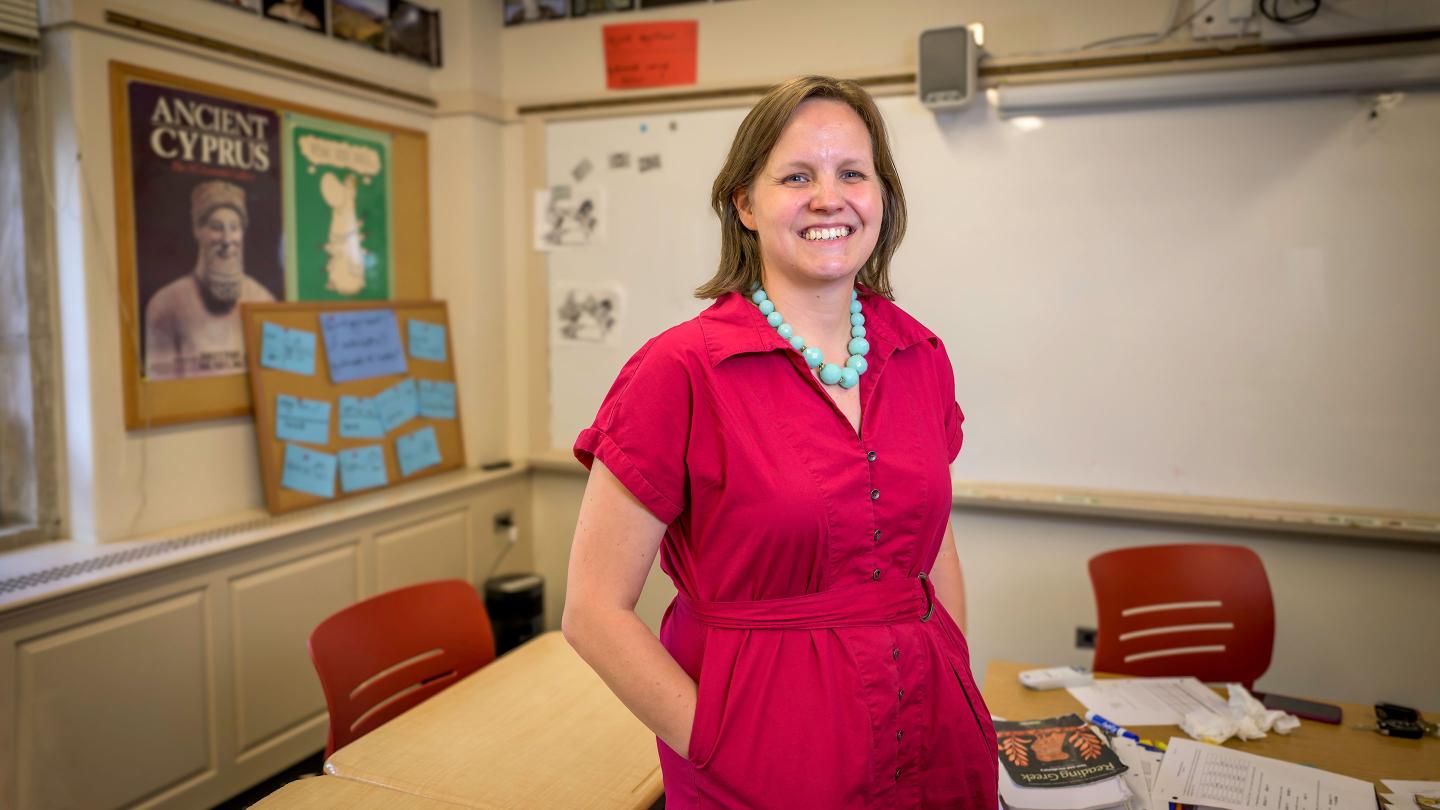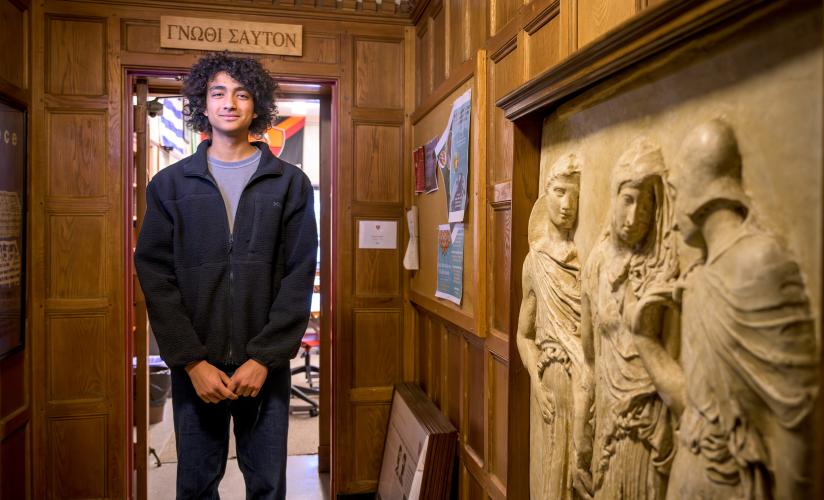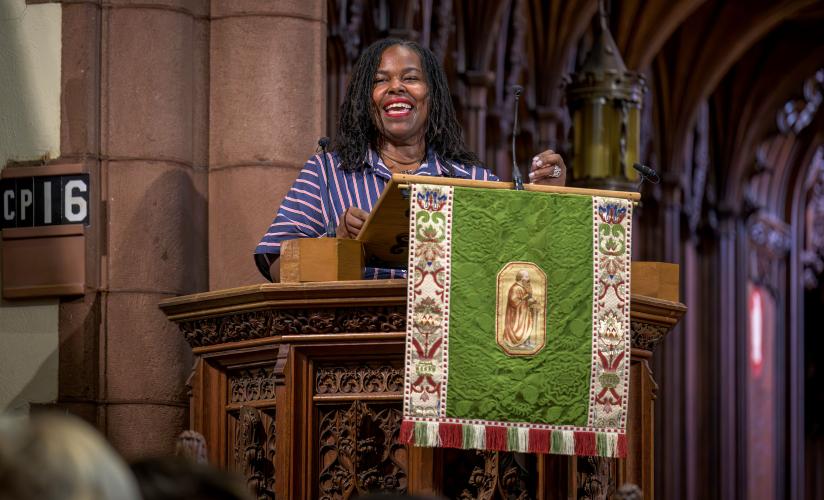

Language Teacher Liz Engelhardt highlights the beauty and satisfaction of learning Latin and ancient Greek — and all the art and history that these languages unlock.
BY KATE DUNLOP
As a child growing up in rural Pennsylvania, Liz Engelhardt was interested in ancient Greek mythology and Roman history. Later, she was intrigued by her Catholic high school theology teacher’s assertion that to really understand concepts from the gospels and the epistles of Paul, one needed to look at the Greek texts. At an academic fair held her first week at Swarthmore College, she chatted with a classics professor who invited her to attend his class. She did, and the rest is recent history: Engelhardt earned her B.A. in ancient Greek and is working toward a Ph.D. in classical philology at Harvard University. Prior to coming to St. Paul’s School in 2016, she taught undergraduate Greek and Latin courses at Harvard and ran a one-woman Latin program for three years at Severn School in Maryland. We sat down to talk about her work as a classicist.
Why is it important to study classics?
Greek and Latin are beautiful and fun languages. They’re incredibly intellectually satisfying to learn and are different in their structure from English. They grew out of civilizations with very different ways of looking at the world; putting yourself in the mindsets of people who lived in a very different place and time is a fascinating exercise.
If you read a good translation of Virgil, you have a pretty satisfying English poetry reading experience, but you’ll never get the full experience. It’s impossible to convey everything that is going on in the original texts. All the good Greek and Latin writers can make certain phrases, word choices and constructions work on multiple levels of meaning. Part of what makes that literature so great is that it grapples with questions and problems that were relevant to people living two or three thousand years ago and are still relevant today. On the one hand, it can make you feel a little frustrated to think, ‘Oh man, we still don’t have answers to a question like how do you keep your society from falling into civil war,’ but on the other hand, it makes you feel less alone to realize that the reason we don’t have an answer is because it’s a genuinely hard problem with which to grapple.
Latin is often considered a dead language, yet its influence on Western Civilization is alive and well. How has it evolved and stayed present in ways people may not recognize?
When people say Latin is a dead language, that’s not necessarily accurate. If you look at medieval manuscripts up until the 12th or 13th century in France, people we now classify as medieval French speakers describe themselves as speaking Latin. They just have different registers of Latins. They talk about the kind of Latin that you speak in everyday life, which we now classify as medieval French, versus the kinds of Latin that you use when you are in church or in the classroom or conducting formal board business. So, to a certain extent, Latin has never stopped evolving. It’s just evolved in diverse enough directions that at a certain point we decided we were going to stop calling it Latin and instead call it Spanish and French and Italian.
There has continued to be evolution and development in the language from antiquity onward. Latin was the language of scholarship in Europe; there are fundamental scientific works that were originally written in Latin. Isaac Newton’s early discussions of physics and calculus are written in Latin. Spanish missionaries traveled to South America and Central America in the 1500s and wrote dispatches back to Europe in Latin. There is a huge amount of important intellectual life from outside the Roman Empire that is in Latin, and it continues to evolve as people come up with scientific discoveries and encounter animals and plants they’ve never seen before.
Would you want to experience the ancient world firsthand?
There are people who study Greek and Latin who feel a deep-seated kinship of who they would have been in the ancient Greek and Roman world. I am always very conscious of my gender and of the fact that I would’ve been married off at 12 in ancient Athens, at 16 or 17 in ancient Rome. There’s a weird double consciousness that you have when studying the texts of a society that would’ve been puzzled and horrified by the idea of a woman standing up and educating their impressionable young men and women.
And yes, sometimes we encounter misogynistic bits of ancient literature. This is the challenge of studying any body of work; my colleagues in humanities deal with the same issue. You have people who are really interesting and turn out literature and ideas and writing that is in many ways uplifting and admirable and really gives you a lot of insight into ideals that you want to uphold and use as a guide to live your life but by the same token hold slaves and can be racist and sexist or downright misogynistic. It’s quite the contrast between ideals and the narrow-minded and exclusive reality of who counts as a person.
There’s this sort of joke about what the ancient Romans would have made of airplanes and I think you would have an easier time getting an ancient Roman or an ancient Athenian to understand that we figured out a way to control fire such that we can have a metal tube with wings soar through the air with people in it than the narrative of two people in a relationship who are equal with equal amounts of consent and agency.
Can you read anything contemporary, or watch a film, and not connect it back to a classic theme or origin story?
There is a ton of stuff where I can see the roots in Greek and Roman literature. “Game of Thrones,” for example, is heavily influenced by medieval history and stories from ancient Greek and Roman history. That was part of the fun for me of watching it. And every single sitcom, with the idea of the sort of jokes and comedic timing and farce, has in its DNA the comedies of Terence and Plautus. There is Roman comedy that we read in Latin seminar that has the exact same joke cadence in the dialogue that you see in any number of classic three-camera sitcoms.
My favorite adaptation of any work of ancient literature is the Coen brothers’ “O Brother, Where Art Thou?” because a really important part of “The Odyssey,” beyond the mythological monsters and gods and whatever, is that Odysseus and other characters are really into telling stories as a way of making sure they’re not forgotten and establishing and burnishing their reputations, but also telling stories because they’ve been through war and a ton of suffering; telling stories is a way to sort of work through these traumatic experiences they have been through.
Last spring, you appeared on an episode of “Jeopardy!” It was a tight game that you led after finding the first Daily Double in the Double Jeopardy round. Congrats on that experience — how did it happen?
I took the online test as a whim, which eventually led to a spot in the contestant pool, where applicants can linger for up to two years. I was approaching that limit when I got the call to head to Los Angeles. It was a really cool experience. A little bit nerve wracking and surreal. My goal was to play the best game I could and not to become a meme that would haunt me for the rest of my life. And also, to not miss the answer to any question that would cause any of my loved ones to feel deeply disappointed in me. It was fun, and the other contestants were just incredibly kind, interesting people.



